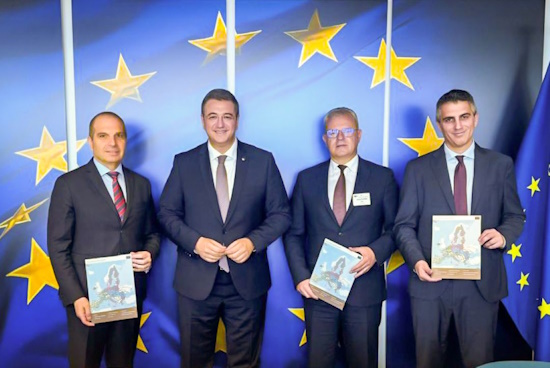A significant agreement for the creation of a modern railway and road interconnection axis between Romania, Bulgaria and Greece was reached at the meeting held in Brussels by the Commissioner for Sustainable Transport and Tourism, Apostolos Tzitzikostas, with the Ministers of Infrastructure and Transport of the three EU Member States.
The Commissioner and the Ministers of Infrastructure and Transport, Romania’s Ionuț Săvoiu, Bulgaria’s Grozdan Karadjov and Greece’s Christos Dimas, agreed to accelerate the road and rail projects from Thessaloniki to Sofia and Bucharest, so as to make a modern Black Sea-Aegean axis a reality, which will serve the safe and rapid movement of millions of citizens of the three countries, both by train and by road.
“Together, we will work on an action plan for the implementation of the necessary interventions on the two corridors, rail and road, which are also part of the Trans-European Transport Networks. Today, we have committed to working on this extremely important project, which will also connect the axis with the Baltic Sea, but also with the Rhine-Danube corridor, and is of interest to the whole of Europe.
Our goal is to create a high-capacity transport and mobility network in a geopolitically important region, while at the same time connecting even better the ports of the Aegean and the Black Sea with the Trans-European Transport Network, within the framework of combined transport. This axis affects not only the movements of millions of European citizens, but also trade, the economy, security, sustainability and military mobility”, Mr. Tzitzikostas pointed out.
The Black Sea and Aegean region are critical transport gateways connecting South-Eastern Europe with key European and global markets. At the same time, the region has significantly increased its importance from a military point of view, especially after the war in Ukraine. Therefore, Greece, Bulgaria, and Romania play a vital role in ensuring efficient, resilient, sustainable, and interconnected transport links on this important part of the Trans-European Transport Networks.
“It is of strategic importance to better connect the Black Sea and Aegean regions, boost cross-border mobility, and facilitate trade and economic development. We need to create a new connectivity model for South-East Europe, where known bottlenecks will be tackled together, creating mutually beneficial situations for all three Member States. This cooperation is the first step towards building a close cooperation between the three Member States with tangible results”, said Mr Tzitzikostas.
The meeting agreed on common priorities:
Upgrading cross-border road and rail connections.
Strengthening port infrastructure and connectivity.
Improving the efficiency of border crossings.
Synchronizing investments to ensure that they reap the full benefits as soon as possible.
Supporting the development of alternative fuels and digitalization.
In fact, the roadmap of the new strategic agreement was agreed upon, according to which, by the end of the summer, an analysis of the network connecting the three countries will be carried out, by the end of November, priority projects will be prioritized and a cooperation agreement will be signed at the end of the year.
The Commissioner had a separate bilateral meeting with the Greek Minister of Infrastructure and Transport, Christos Dimas, where the situation in the aviation sector in the country and especially air traffic management in view of the peak tourist season were discussed.
